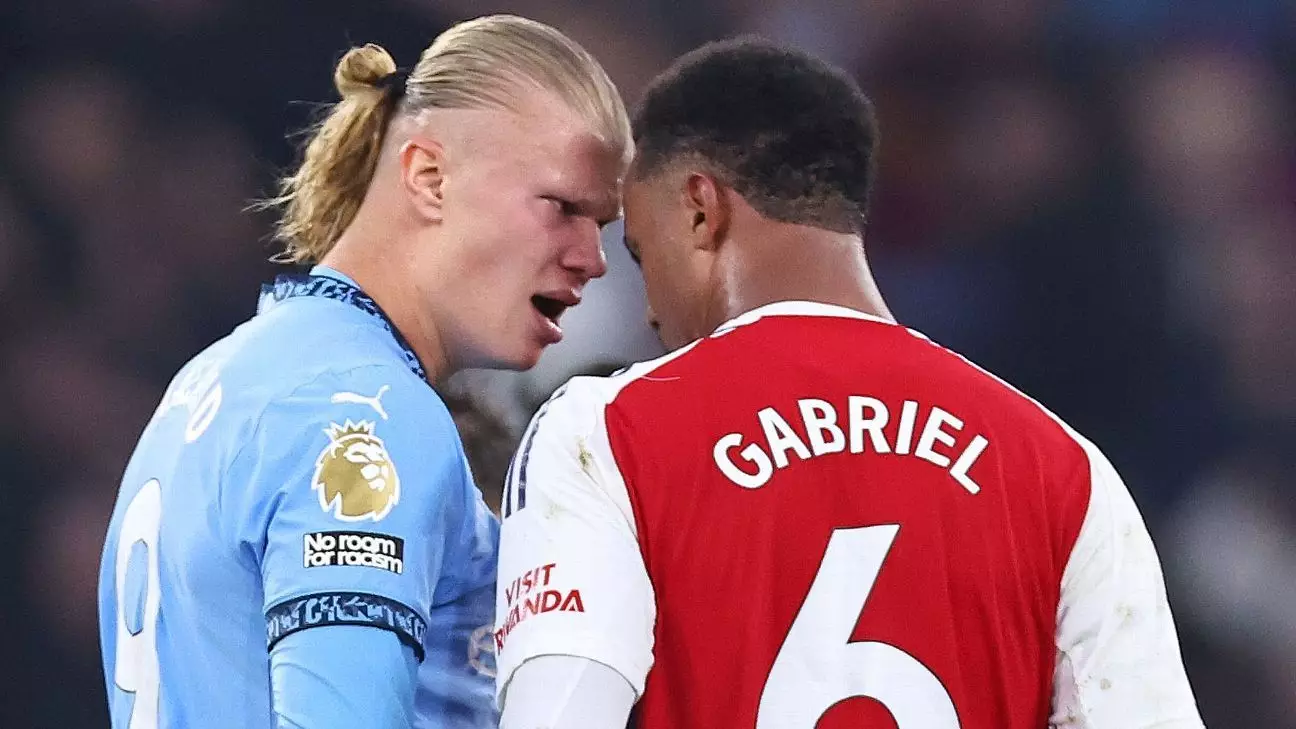In a thrilling encounter at the Etihad Stadium, Manchester City and Arsenal played to an electrifying 2-2 draw on Sunday, with John Stones rescuing a point for City with a dramatic equaliser in the 98th minute. This match not only showcased the grit of both teams but also highlighted the contrasting narratives of their seasons thus far. While City maintained their usual attacking prowess, Arsenal proved that they have the tenacity to compete with the best, even when reduced to ten men for the entire second half.
The home side surged ahead early with Erling Haaland scoring his 100th goal for Manchester City, achieving this remarkable feat in just 105 appearances. However, Arsenal’s response was compelling. Riccardo Calafiori made an unforgettable league debut and found the net with an exquisite strike, followed by Gabriel Magalhães’ header from a corner kick, which put the Gunners briefly ahead. The match took a decisive turn when Leandro Trossard received a controversial second yellow card for kicking the ball away after a foul, prompting a strong reaction from Arsenal’s manager, Mikel Arteta.
The officiating in this encounter left much to be desired for various reasons. Trossard’s dismissal, though justifiable, sparked discussions about inconsistencies in refereeing decisions regarding time-wasting. Arsenal had previously experienced similar disciplinary issues, and this incident marked the second time in three league matches that a player had been penalised for a similar offence. Fans and analysts alike noticed that while Arsenal faced scrutiny, decisions appeared unevenly applied across both teams.
For instance, Joao Pedro escaped admonishment for time-wasting in Arsenal’s previous encounter, raising concerns about a potential double standard in officiating. Since Arteta took charge in December 2019, Arsenal has consistently ranked poorly in terms of player discipline, with 17 red cards accrued—four more than any other Premier League team. This statistic casts a shadow over Arsenal’s growing competitive edge, as they grapple with the difficulty of maintaining discipline while passionately contesting for victories.
Arteta has managed to infuse a newfound aggression and resilience into his Arsenal squad. The change was evident right from kick-off when Kai Havertz’s robust challenge on Rodri set the tone for a fiercely contested match. The critics who previously lambasted Arsenal for lacking the necessary edge in their encounters with Manchester City may need to reconsider their assessments. This season, Arteta’s men have begun to display a competitive toughness reminiscent of the legendary squads under Arsène Wenger.
Though these characteristics aren’t necessarily enough to guarantee triumph over a dominant side like City, they reflect a deeper transformation in the team’s mentality. Players like Calafiori and Jurriën Timber are quickly developing a reputation for being difficult adversaries, further instilling confidence in a team that had struggled to assert itself in past seasons.
Manchester City’s performance in the second half raised questions about their attacking strategy, particularly in the absence of Rodri due to injury. The loss of their central figure—considered one of the world’s best defensive midfielders—exposed cracks that City has rarely shown in recent years.
City dominated possession but found it increasingly challenging to break through Arsenal’s resolute defense, leading to awkward and predictable attempts at goal. Guardiola’s decision-making was scrutinised, as he waited far longer than necessary to introduce crucial substitutions. The stubborn approach ultimately backfired, as City continued to rely heavily on long-range efforts while Arsenal held firm in their defensive setup.
Though Guardiola secured a point, the situation showcased a need for flexible tactical approaches when facing a determined opponent. The lingering question remains: can City maintain their title ambitions without Rodri at the helm, especially after showcasing vulnerabilities that could prove harmful in tighter matches?
This thrilling clash not only enforced the intense rivalry between Manchester City and Arsenal but also provided evidence that both teams have the potential to become title contenders. For Arsenal, the renewed competitiveness showcased a determined effort to finally break the long-standing dominance of City in the Premier League.
Ultimately, both managers have plenty to reflect on moving forward. Arteta can take pride in his team’s resilience and tactical growth, while Guardiola must reassess how best to exploit opponents without his key players. The match ended in a draw, but the narrative surrounding both teams is only beginning to unfold as they navigate the challenges that lie ahead. The journey for supremacy continues, and both clubs will be eager to assess how to operate under pressure as the season progresses.

